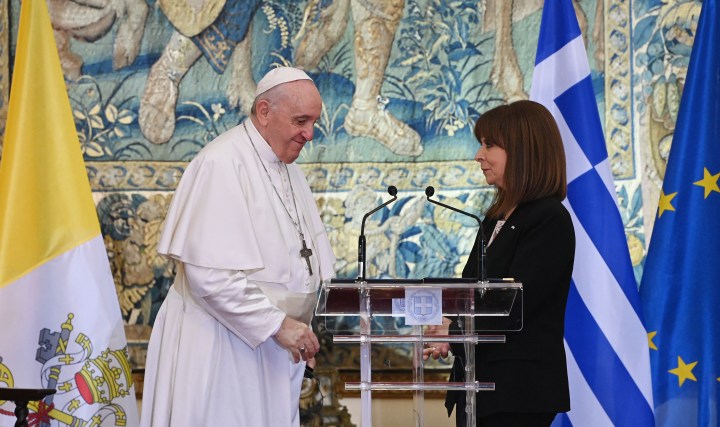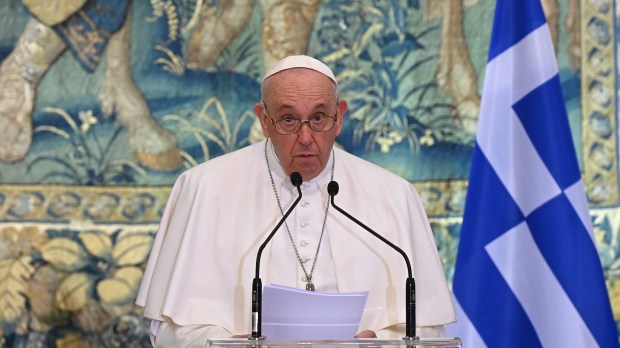From Athens, Pope Francis spoke warnings applicable to much of the world, lamenting a “retreat from democracy” happening in many countries, and decrying both abortion and euthanasia.
In Athens, the cradle of democracy, he made a plea for a move from “partisanship to participation,” so that the good can be truly shared. And he again called for Europe to change its attitude on the issue of migrants.
From Mount Olympus to the Acropolis to Mount Athos, Greece invites men and women of every age to direct their journey of life towards the heights. Towards God, for we need transcendence in order to be truly human. Today, in the West that emerged from here, there is a forgetfulness of our need for heaven, trapped as we are between the frenzy of a thousand earthly concerns and the insatiable greed of a depersonalizing consumerism. Yet places such as these invite us to feel wonder before the infinite, the beauty of being, and the joy of faith.

The Holy Father noted the special mission of Greece in the world: “Without Athens and without Greece, Europe and the world would not be what they are. They would be less wise, less happy.”
And, he reflected:
Here were the paths travelled by the Gospel, uniting East and West, the Holy Places in Europe, Jerusalem and Rome. In order to bring to the world and the good news of God, lover of mankind, the Gospels were written in Greek, the undying language in which the Word – the Logos – expressed himself, the language of human wisdom which became the voice of divine Wisdom.
Democracy
And it was in Greece that “according to the celebrated words of Socrates, people began to view themselves as citizens not only of a single city, or a single country, but of the entire world. Citizens. … Here democracy was born.”
But, the Pope warned, “We cannot avoid noting with concern how today, and not only in Europe, we are witnessing a retreat from democracy.”
Democracy requires “hard work and patience,” Pope Francis acknowledged. Whereas “authoritarianism is peremptory and populism’s easy answers appear attractive.”
Concern for security, the dulling effect of consumerism, the distance of institutions, fear of a loss of identity, bureaucracy … all these can lead to a skepticism about democracy.
“Good politics” is the remedy, the Pope proposed: “For politics is, and ought to be in practice, a good thing, as the supreme responsibility of citizens and as the art of the common good.”
To move forward
The Pope said that there must be an emphasis on caring for the weakest.
So that the good can be truly shared, particular attention, I would even say priority, should be given to the weaker strata of society. This is the direction to take.
One of Europe’s founding fathers indicated it as an antidote to the polarizations that enliven democracy, but also risk debilitating it. As he said: “There is much talk of who is moving left or right, but the decisive thing is to move forward, and to move forward means to move towards social justice” (A. DE GASPERI, Address in Milan, 23 April 1949).
Hippocrates for our times
Speaking of the challenges caused by the pandemic, the Pope referred to the oath of Hippocrates, saying that some seems written for our time:
… such as the commitment to “follow that regimen I judge best for the benefit of the sick” and “to abstain from whatever is harmful and offensive” to others, to safeguarding life at every moment, particularly in the mother’s womb (cf. Hippocratic Oath, ancient text).
The right of all to care and treatment must always be respected, so that those most vulnerable, particularly the elderly, may never be discarded: that the elderly may not be subject to a “throwaway culture.” The elderly are the sign of a people’s wisdom. For life is a right, not death. Death is to be accepted, not administered.
Human freedom, God’s gift
The Holy Father reflected on some of the age-old olive trees of the Mediterranean, some of which predate the coming of Christ. They remind us, he said, “of preserving deep roots, fortified by memory. This country can rightly be called the memory of Europe – you are the memory of Europe – and I am happy to visit twenty years after the historic visit of Pope John Paul II, and in this year that marks the bicentenary of its independence.”
I think of the well-known words of General Kolokotronis: “God has set his signature on the freedom of Greece”. God readily sets his signature on human freedom, always and everywhere. It is his greatest gift to us, the gift that, in turn, he values most from us. For God created us to be free, and what most pleases him is that, in freedom, we love him and our neighbour. Laws exist to help make this possible, but also training in responsibility and the growth of a culture of respect.

